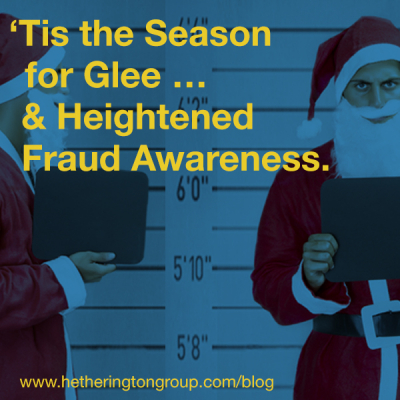 The end of a year brings friends and families together to bask in love, good food, and the exchanging of gifts. With merriment, folks seek out the perfect gift at a retail store, and, increasingly, online for that special someone. The end of the year is also a time when many seek out a favorite charity or two to make a donation, recognizing that there are many in need of food, clothing, and other supportive services.
The end of a year brings friends and families together to bask in love, good food, and the exchanging of gifts. With merriment, folks seek out the perfect gift at a retail store, and, increasingly, online for that special someone. The end of the year is also a time when many seek out a favorite charity or two to make a donation, recognizing that there are many in need of food, clothing, and other supportive services.
There are myriad sources that help consumers and philanthropists protect their identity and financial security during the holiday season. In Hg’s second of a three-part series on fraudulent activities, we highlight 5 of those that should be on your checklist as you round out 2018 and ring in 2019.
Charitable Donations
In 2017, annual giving by individuals in America grew by 5.2%, for a total of $286.65 billion dollars donated to charities. With 31% of donations received, religion topped the chart, followed by education and human services.
The Chicago Sun Times noted that before responding to an email request to support your favorite charity, you should make sure it is your favorite charity. Fraudsters are on the prey, creating fake charity names that are close to the real one in hopes you won’t realize that “Red Cross of Americas” is not the real “American Red Cross.”
1. Consumer Tip: Check with a reputable charity database service such CharityNavigator.org or GuideStar.org to confirm the name of the organization, its Employer Identification Number (EIN), and then double back to IRS.gov to confirm it is registered as a 501(c)(3) charity. Make your donation by check or credit card, not cash, on the charity’s website or by calling their office.
Online Purchases & Package Delivery
A friend who lives in a rural Midwestern community shared the following story: Her neighbor had ordered three Christmas presents for her husband. One from Amazon, one from JCrew, and another from L.L.Bean. She had done the right thing by opting for delivery notification, so she knew that all three packages had arrived on the same day at the same time. The problem: She wasn’t at home, and the packages were left on her doorstep. When she came home, the packages were missing.
Where’d they go? Times Free Press reported that about 23 million packages are stolen after being delivered annually. Fraudsters will trail a FedEx or UPS truck, watching for packages left on doorsteps and stoops and snatch them up.
2. Consumer Tip: Although it may be inconvenient, require a signature for all packages delivered. Another option is to send packages to your or your loved one’s place of work. And finally, check out Amazon’s Locker service. 2800 lockers are conveniently located in over 70 metropolitan regions—thief proof!
Gift Cards
Do you prefer a gift card over an ugly sweater from Aunt Matilda? If so, you’re a member of an ever-growing club. According to the National Retail Federation, over 60% of Americans are hoping to receive gift cards instead of the ugly sweater this year. Americans are expected to spend $29.9 billion on gift cards, with restaurants, department stores, and Visa/MC/AmEX at the top of the list.
But as with most everything these days, scammers and fraudsters are on the hunt to Grinch your holiday spirit. From websites that sell expired or faux gift cards at a discount to the unsuspecting thief who scratches off the PIN and keeps the number handy until the card has been purchased and activated, there are a number of ways to make sure you aren’t duped.
3. Consumer Tip: Check to be sure that the gift card’s protective coating hiding the PIN hasn’t been scratched off. Does the card expire? If so, make sure you let the person know when you gift it. Remember Borders? In 2013, the mega bookseller filed for bankruptcy, leaving $210 million in gift card credit worthless. Make sure the company will still be in business in 2019.
Reporting Fraud
4. Consumer Tip: The Better Business Bureau posted a wonderful article that identifies myriad other scams and fraudulent activities anticipated this month in particular. They recommend that if you are an unfortunate victim of fraud, you can share the love by reporting the crime to the BBB Scam Tracker and filing a complaint with the FBI’s Internet Crime Complain Center (IC3).
Hg’s gift to you this year is A Tip for All Months of the Year:
Our digitized, globalized world has opened the doors to eCommerce, eCommunications, and, unfortunately, eFraud. Now more than ever— whether you purchase items online or not—it’s important to check your bank and credit card accounts to be sure there aren’t purchases made by someone other than you. If you find anomalies in your statement, contact your financial institution immediately to report the fraudulent activity and have your card replaced.
We wish you a financially safe, happy, and healthy holiday season to you and yours!
Cynthia Hetherington, MLS, MSM, CFE, CII is the founder and president of Hetherington Group, a consulting, publishing, and training firm that leads in due diligence, corporate intelligence, and cyber investigations by keeping pace with the latest security threats and assessments. She has authored three books on how to conduct investigations, is the publisher of the newsletter, Data2know: Internet and Online Intelligence, and annually trains thousands of investigators, security professionals, attorneys, accountants, auditors, military intelligence professionals, and federal, state, and local agencies on best practices in the public and private sectors.



